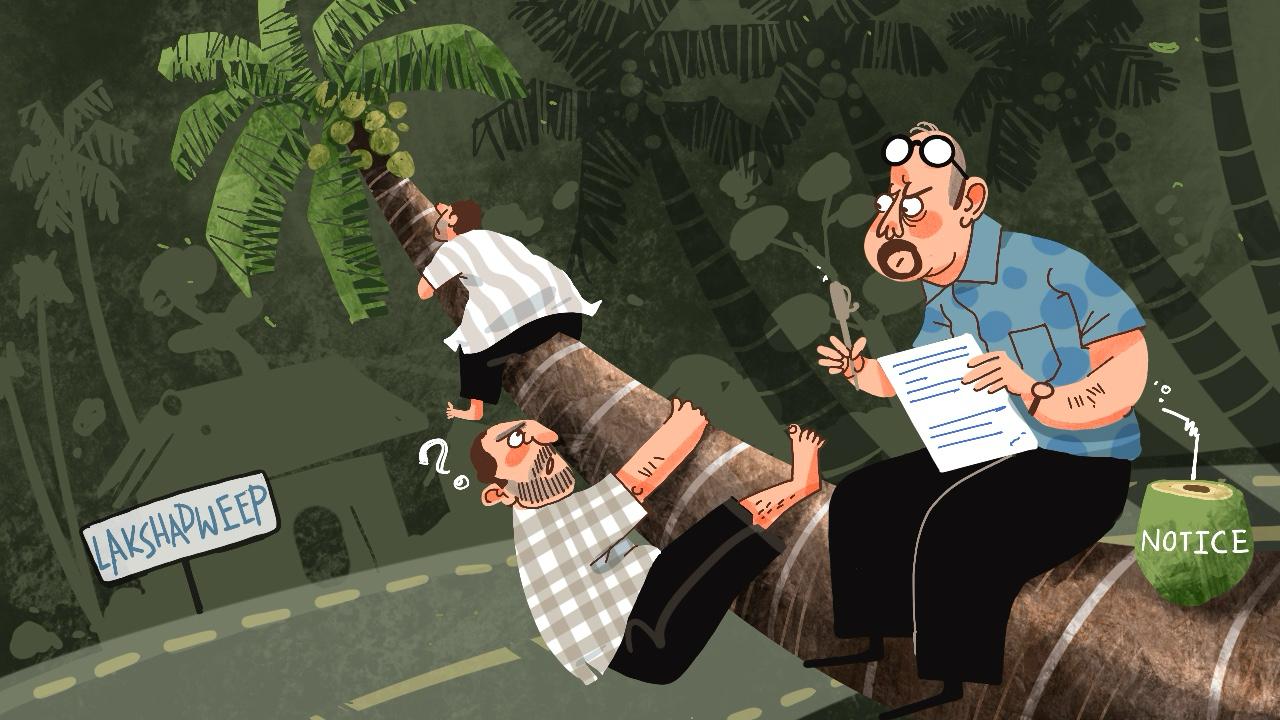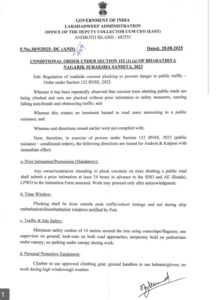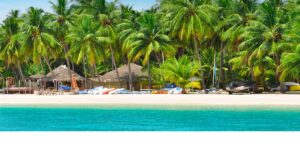The controversial new order from the Lakshadweep administration demands police clearance even for plucking coconuts.
Published Sep 11, 2025 | 9:00 AM ⚊ Updated Sep 26, 2025 | 11:15 AM

A controversial new order from the Lakshadweep administration demands police clearance even for plucking coconuts.
Synopsis: It could be ignorance or a bid to saffronise the archipelago, where Muslims comprise over 96% of the population. The islanders have been plucking coconuts safely for ages, but the administration now wants prior permission to harvest the yield from trees near roads.
The residents of Lakshadweep have been plucking coconuts unhindered for ages, until the administration of the archipelago issued an order for Andrott and Kalpeni islands that many feel is plain nuts!
Now, coconuts in Lakshadweep — some 220 to 440 kilometres off the Malabar coast in mainland India — have become the centre of a controversy. And, it is not the first time: In 2021, the coconut trees, emblematic of the verdant islands scattered in turquoise waters, found themselves mired in a controversy after the administration painted the bottom third of trees in saffron, and the middle third in white.
The “saffronisation” of trees in Muslim majority areas such as Kavaratti and Agatti has been seen as a blatant bid to peddle the Sangh Parivar agenda. The apparent political appropriation move drew sharp criticism from the islands and across the waters.
”It began with painting coconut trees saffron, and now it has reached a stage where the livelihood and culture of the people are being affected,” Kerala’s Chief Minister Pinarayi Vijayan said.
Four years later, the controversy has climbed the trees from the bottom to the top.
Years later, another chapter has opened, not about the tree trunks, but about the coconut itself.
For Lakshadweep, coconuts are part of the island group’s heritage. The islands thrive on their rich biodiversity, with the crop sustaining both the economy and everyday life. From the fragrant Dweep jaggery to the Lakshadweep halwa, locally known as Dweep unda, the flavor of coconut runs deep through kitchens, customs, and culture.
It is the lifeline of the islanders.
Today, this lifeline stands threatened. The controversial new order from the Lakshadweep administration demands police clearance even for plucking coconuts.
The Lakshadweep Administration has issued a conditional order under Section 152 of the BNSS, 2023, to regulate plucking coconuts from trees abutting roads to prevent accidents caused by falling nuts and fronds.

A copy of the order issued on 28 August 2025.
Deputy Collector and Executive Magistrate Mukund Vilas Joshi’s order said the administration has repeatedly observed that coconut trees abutting public roads are climbed and plucked without prior intimation or safety measures, creating hazards for motorists and pedestrians.
The order noted that earlier oral instructions were not followed, prompting the administration to enforce stricter guidelines.
As per the new rules, any owner or contractor intending to pluck coconuts along roadsides must seek prior permission by submitting an intimation form at least 24 hours in advance to the Police Station House Officer and the Assistant Engineer (Roads), LPWD.
Coconuts could be plucked only after getting an acknowledgement.
The order also specified a time window for the activity, restricting coconut plucking during peak traffic hours, school timings, and ship embarkation or disembarkation schedules.
A minimum safety cordon of 10 metres must be maintained using cones, tape, or flagmen, with ground supervisors ensuring traffic safety. Parking and pedestrian movement under the trees are strictly prohibited while work is in progress.
Additional safety measures include the use of approved climbing gear, helmets, and gloves for workers, while operations are barred during high winds or rough weather. Fronds and nuts must be lowered by rope to avoid free fall, and the roadway must be cleared immediately after work.
The order makes owners and contractors personally responsible for any damage or injury caused due to non-compliance, and they must promptly restore traffic flow if disrupted.

Coconut groves forming the background for turquoise water and silver sand are emblematic of Lakshadweep.
Enforcement will be monitored by the SHO and the Assistant Engineer (Roads). Violations could attract proceedings under Sections 152–162 BNSS, prosecution for disobedience, and even cost recovery for traffic management in case of repeat offences.
The administration has directed coconut tree owners and climbers in Androth and Kalpeni to strictly follow the guidelines.
Interestingly, people in Lakshadweep have been plucking coconuts for ages, much like their brethren across the Arabian Sea in Kerala, a state synonymous with coconut trees, where no restrictions exist on felling coconuts. Kerala, additionally, has jackfruit trees in abundance.
Dweep resident Advocate Ajmal Ahmed R told South First that the order turned controversial and sparked protests from locals, dependent on coconut trees.
He has submitted a formal objection before the District Collector on Monday, 8 September, arguing that coconut plucking has been a traditional occupation and the primary source of income for islanders.
”The order imposes impractical restrictions such as prior written intimation, mandatory safety cordons, cones, flagmen, helmets, and 24-hour advance permission, requirements that small farmers and climbers cannot financially or practically meet.
While the order claimed it was meant to improve safety, it posed a serious threat to livelihood, besides placing unreasonable restrictions on the constitutional right to occupation guaranteed under Article 19(1)(g).
He further criticised the administration for issuing the directive without consulting the stakeholders.
Ahmed suggested that safety concerns could instead be addressed through awareness campaigns and voluntary precautions rather than imposing rigid rules that make roadside coconut plucking nearly impossible.
Youth Congress leader Sabith, also a resident of Lakhshadweep, felt that the administration was questioning the civic sense of the islanders by issuing the order.
“People here have the basic civic sense not to pluck coconuts if someone is underneath the tree. They have been plucking coconuts for centuries,” Sabith said.
The order cited safety concerns. Sabith said there had been no major incident reported while plucking coconuts. He pointed out that not everyone owns plenty of trees. Many have just a few for domestic use. If such restrictions were enforced, people might stop plucking altogether, which would only create more problems and tragedies.
”Who will go to a police station if they want to prepare chutney for breakfast?” he asked, adding that the number of trained climbers was already declining and the order would only worsen the situation.
Quraishi, a CPI(M) leader from Androth, also criticised the move, saying his party would soon protest against it.
The order directly affects people’s lives, denies job opportunities to local workers, and serves no purpose other than making islanders’ lives miserable, he said.
Non-islanders, who hear about the order, might scoff at the ‘nutty’ order, but for islanders, it is a matter of deep distress.
For the islanders, this is not just a rule; it feels like an assault on their way of life. People now feel alienated, as though they are not even part of a democratic land. After all, democracy should exist to ease lives, not entangle them in needless restrictions.
”Without fish and coconut, how can Lakshadweep survive?” asked Nizam, a resident. His question remained unheard and unanswered, just like the fate of a community watching its traditions and livelihood slowly slip away.
(Edited by Majnu Babu).
